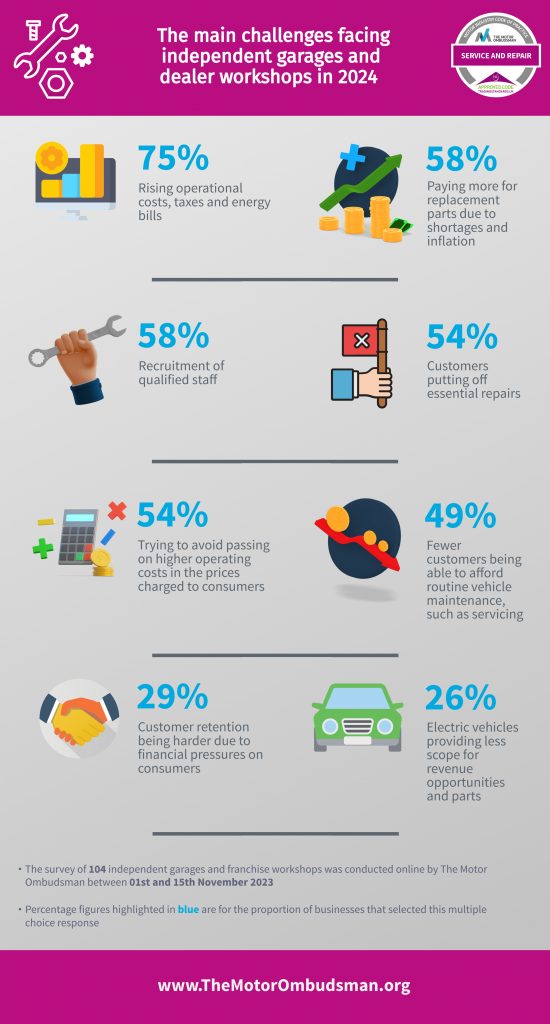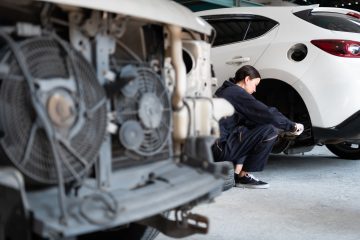A new survey of independent garages and franchise dealer workshops has revealed the significant challenges the aftermarket expects to face in 2024.
The Motor Ombudsman annual survey has revealed that rising operational costs, taxes and energy bills are set to be the most significant challenge for three-quarters of vehicle repairers during the coming year.
This will be further compounded by the expectation that they will have to pay more than in 2023 for spare parts to fix customer vehicles, likely due to factors, such as shortages and inflation (58%), illustrating the headwinds that continue to face businesses in the UK’s service and repair sector.

Just over half (54%) of respondents stated in the Motor Ombudsman annual survey that they would reach the dilemma of having to raise prices to sustain a viable business which is costing more to run. This also comes at a time when garages foresee consumers putting off essential repairs (54%), and routine maintenance (49%) to save money, as household finances remain under strain.
No change in some Motor Ombudsman annual survey findings
In last year’s Motor Ombudsman annual survey, 53% of businesses said they had witnessed customers avoid bringing their car in, so as to reduce the level of spend on their vehicles due to the widely-reported cost of living crisis.
This is a trend that is likely to continue into 2024, even though drivers are holding on to their cars for longer, and the UK car parc is continuing to age as a result. Numerous reports in the year since the last Motor Ombudsman annual survey have suggested vehicle owners are reducing the amount they spend on servicing, with some even dangerously running their cars on well-worn tyres, or without an MOT.
Echoing the difficulty with recruiting additional technicians by 56% of repairers when questioned about the main factors that put them to the test last year, a greater proportion (58%) expressed the same concern when looking ahead to the next 12 months in 2024, as qualified and skilled mechanics remain an increasingly sought-after resource in the labour market.
This also paints a more challenging picture for hiring staff, when The Motor Ombudsman’s own research showed that 50% of businesses struggled to recruit the technicians needed to meet demand in 2022.
Fears over electric vehicles drop
With both new and used electric vehicles (EVs) increasing in popularity amongst consumers, and with fewer mechanical parts than petrol and diesel models, reducing the need for maintenance, 26% of repairers responded in the survey to say that battery-powered cars would provide less scope for additional revenue opportunities and replacement parts in 2024.
However, this is encouragingly down from 32% seen in the same study about expectations ahead of 2023, as more businesses look to embrace new technologies and seek other revenue streams.
Despite recent declines in the EV market, it is as robust as ever, with drops only due to exceptional circumstances experienced in the 2022 figures, and a need for carmakers to meet ZEV mandate targets in 2024. As fleets have driven EV adoption in 2023, the independent sector needs to prepare for a boom in electric-vehicle work, as these models filter into the used-car market in the coming years.
In terms of the positive developments that garages and workshops are seeking to bring to their business this year, over half (52%) said they would look to invest in recruitment to expand their workforce from a competitive pool. In addition, over a third of respondents (35%) explained that they will be considering refurbishing existing premises to improve the look and feel of the experience for customers, with a fifth planning to add workshop and MOT bays, as well as additional on-site electric vehicle charging points to accommodate growing demand for EVs.
Furthermore, nearly a quarter stated they intend to participate in webinars and training courses to bring improvements in the way that they work across their organisation.
“Our latest Motor Ombudsman annual survey presents a clear picture in that garages and workshops will still have to contend with a number of underlying challenges this year, with rising costs one of the most pertinent, as this ultimately affects their bottom line,” stated Bill Fennell, Chief Ombudsman and Managing Director of The Motor Ombudsman. “This will need to be balanced with the need to remain competitive in order to deliver an attractive proposition to motorists, at a time when household budgets remain under strain.”
“Accreditation to The Motor Ombudsman will continue to serve as an important and key point of differentiation for garages and workshops. This showcases a commitment to high standards of work and service, coupled with the added reassurance that there is an independent and impartial body on hand to help bring any unresolved disputes to a swift and fair conclusion at no charge to consumers.”




You must be logged in to post a comment.